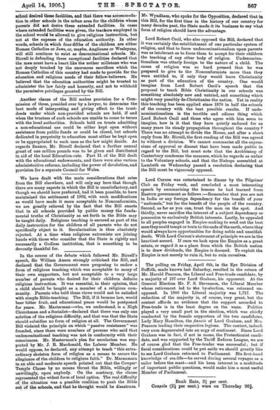Lord Robert Cecil, who also opposed the Bill, declared that
it was certainly the establishment of one particular system of religion, and that to force un.denominationalism upon parents was as intolerant as to force them to accept for their children the teaching of any other body of religion. Undenomina- tionalism was utterly foreign to the nature of a child. The cause of religion was so hard pressed that he was prepared to give to the Nonconformists more than they were entitled to, if only they would leave Christianity as part of the education of the country. One would imagine from Lord Robert Cecil's speech that the proposal to teach Bible Christianity in our schools was something absolutely new and untried, and something which might very possibly de-Christianise the nation. Yet in reality this teaching has been applied since 1870 in half the schools of the country with the best possible results. If unde- nominationalism is the terrible and odious thing which Lord Robert Cecil and those who agree with him seem to imagine, how is it that they have quietly endured for so many years its steady propagation throughout the country P There was no attempt to divide the House, and after a short reply from Mr. Birrell, the first reading of the Bill was agreed to without a division. We cannot summarise all the expres- sions of approval or dissent that have been made public in regard to the Bill, but must note that the Archbishop of Canterbury condemns the measure, which he regards as unfair to the Voluntary schools, and that the Bishops assembled at Lambeth on Wednesday passed a resolution declaring that the Bill must be vigorously opposed.






































 Previous page
Previous page